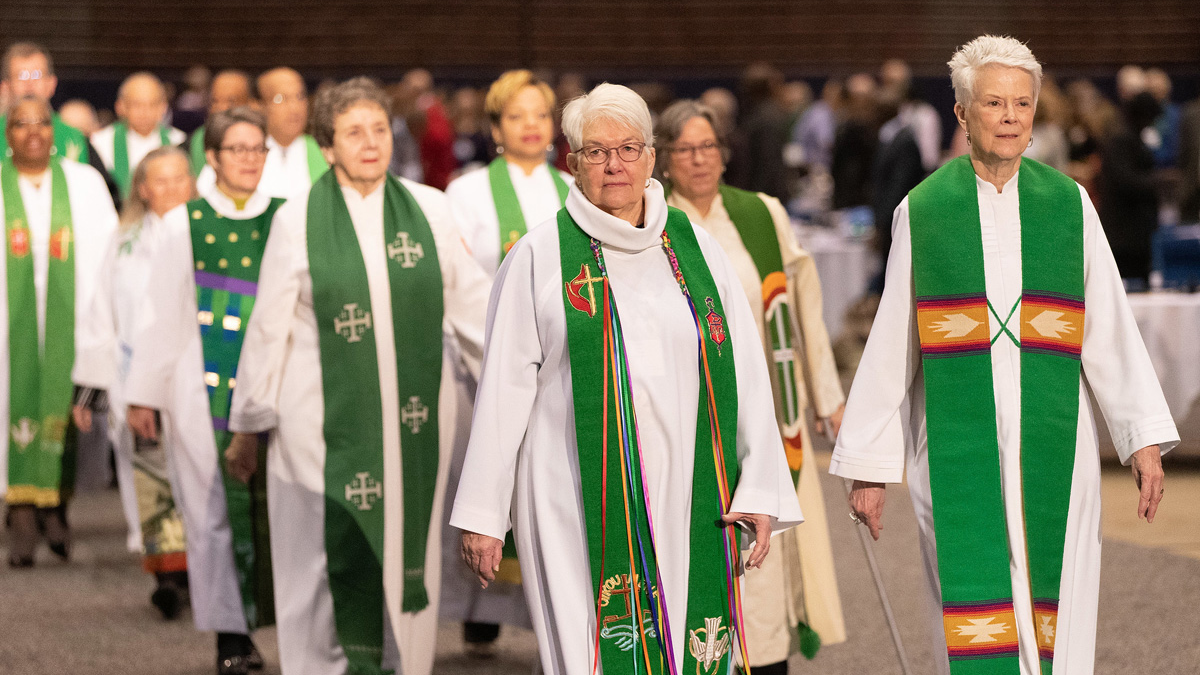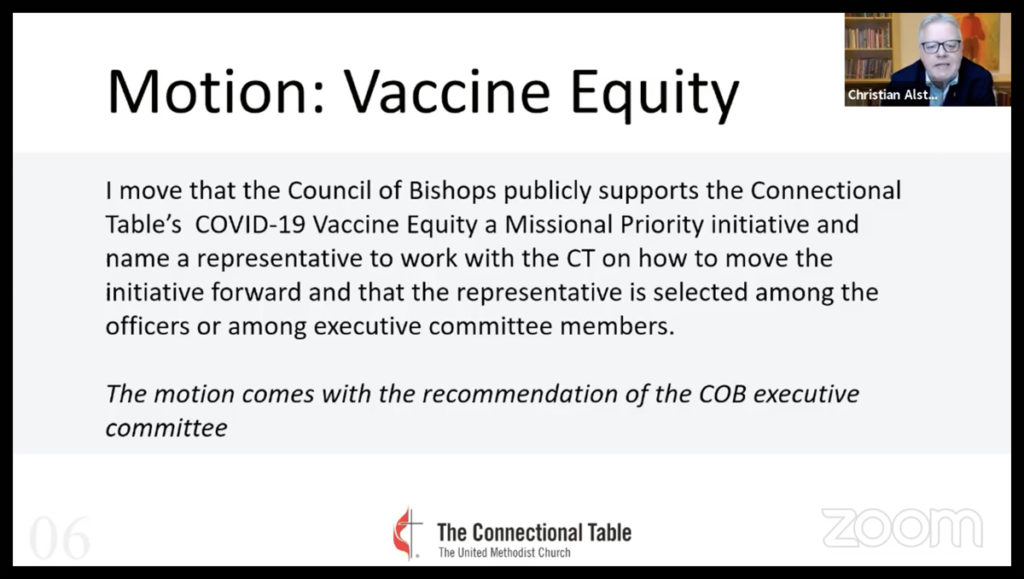
Over a busy three and half hours, United Methodist bishops spent the last day of their fall online meeting making a range of decisions on church life and global challenges.
The Council of Bishops on Nov. 5 affirmed a denomination-wide vaccination effort, approved its 2022 budget and supported further study of online communion.
The bishops also announced their earlier approval of five actions aimed at helping to mitigate climate change.
At Council of Bishops meetings, only active bishops vote. Here is a look at some key actions the bishops took as their Nov. 2-5 meeting concluded.
Vaccines
The bishops unanimously voted to support the Connectional Table’s initiative to make COVID-19 vaccine equity a denomination-wide missional priority. The bishops also agreed to send one of their number to help the Connectional Table move its initiative forward.

The Connectional Table, which acts as a sort of denomination-wide church council, committed to a massive and sustained effort for global vaccine equity, access and education. In practice, that has meant coordinating with ongoing agency and church efforts to counter misinformation and get more shots in arms, especially in countries struggling to afford vaccines.
The United Methodist Board of Global Ministries recently announced a new Advance — church-speak for a designated giving program — with 100% of donations going to UNICEF for vaccinations in low-income countries. First United Methodist Church in Boise, Idaho, helped get the effort off the ground.
The Council of Bishops and Connectional Table plan to focus primarily on vaccine advocacy rather than delivery. There is widespread agreement that the need is great. More than 5 million people around the globe have died of COVID-19.
“As COVID-19 continues to decimate communities around the globe, we believe that it is vital to bring the prophetic voice in our denomination to bear on this matter,” said Nordic-Baltic Area Bishop Christian Alsted, the Connectional Table’s chair.
Finances
The bishops learned two years ago that without changes, the Episcopal Fund that finances their work was in danger of running out of money.
On Nov. 5, the bishops heard that the Episcopal Fund is now in much better shape. Giving to the fund is up and spending is down.
However, Bishop David Graves — who chairs the bishops’ finance committee — cautioned that much of the Episcopal Fund’s improved outlook is the result of the pandemic.
The Episcopal Fund received nearly $1.4 million in loan forgiveness through the pandemic-prompted U.S. Paycheck Protection Program. Because of travel restrictions, bishops have seen cost savings as they conduct most meetings online. They also are taking on expanded assignments as colleagues retire and bishop elections are delayed.
Graves is among them. He now leads the Alabama-West Florida and South Georgia conferences.
The number of active bishops will drop from 66 in 2016 to 54 at the start of 2022 — with retired bishops serving as interims in the Northern Illinois and Sierra Leone conferences. Even with that reduction, Rick King of the General Council on Finance and Administration told the bishops that collections must remain strong to avoid deficit spending.
At the end of the presentation, the bishops approved a spending plan of about $21.4 million for 2022 — about $1.4 million less than their approved spending plan for 2021. The General Council on Finance and Administration board will take up spending plans for denomination-wide ministries at its Nov. 30-Dec. 1 meeting.
“There’s a lot of uncertainty as we move forward around collections and expenses, but we just pause and give thanks for where we are today,” Graves said.
Online communion
Last year, as the pandemic forced churches around the globe to go virtual, many pastors grappled with the question: Should they offer Holy Communion online?
Bishops offered differing views on the practice last year. In 2013, as many churches were beginning to offer online worship, the Council of Bishops supported a moratorium on online communion and further study. Such study fell by the wayside as United Methodists turned their focus toward divisions over sexuality, not sacraments.
Now, with many churches offering worship both in person and online, the bishops want to revisit the discussion.
The bishops authorized the United Methodist Committee on Faith and Order — which includes both scholars and episcopal leaders — to undertake a theological consideration of online communion. The committee then is to report back to the Council of Bishops.
Bishop Karen Oliveto, chair of the bishops’ Faith and Order Leadership Team, said the team believes theological reflection is needed.
“We believe it’s important that we engage our theological task for the testing, renewal, elaboration and application of our understanding of online communion,” said Oliveto, who also leads the Mountain Sky Conference.
Climate crisis
As the Nov. 5 open session began, Council of Bishops President Cynthia Fierro Harvey announced the actions the bishops took in closed session earlier in the week.
Among those decisions, the bishops approved five responses to the climate crisis that is increasing the severity of natural disasters around the world and contributing to record global migration.
The bishops pledged to:
- Encourage and support action on climate change at the annual conference level, including support for moving toward net-zero greenhouse gas emissions.
- Review the Council of Bishops 2009 document “God’s Renewed Creation” to determine how to best address the intersection of climate change, poverty, racism and colonialism.
- Encourage the use of the United Methodist Board of Church and Society website to sign onto letters related to climate justice.
- Join the denomination’s 13 general agencies’ pledge to achieve net-zero greenhouse gas emissions by 2050 across ministries, facilities, operations and investments.
- Reaffirm the denomination’s Social Principle on Global Climate Stewardship as an ongoing commitment. The Social Principle, approved by General Conference, supports government efforts to mandate reductions in greenhouse gas emissions.
The bishops’ pledge described climate change “as an existential crisis the Church cannot ignore.”
Hahn is assistant news editor for UM News. Contact her at (615) 742-5470 or newsdesk@umcom.org. To read more United Methodist news, subscribe to the free Daily or Friday Digests.
